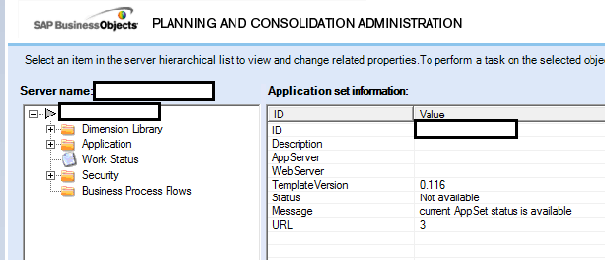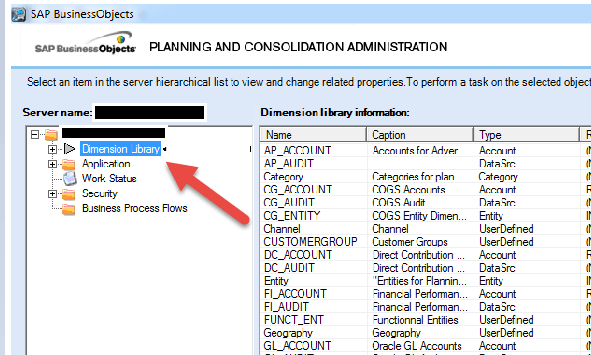SAP BPC Planning & Consolidation System
What is SAP BPC?
SAP BPC is a SAP module that provides planning, budget, forecast, and financial consolidation capabilities. SAP BPC meaning Business Planning and Consolidation. It provides a single view of financial and operational data and a unified solution that supports Performance Management processes like adjust plans and forecasts or speed up the budget and closing cycles.
It delivers built-in functionalities for
- Strategic Planning
- Budgeting
- Reporting
- Forecasting
There are two platforms in SAP BPC finance. About 80% of its functionality is same except the difference in the back-end. In each platform, there is two version.
- SAP BPC MS (Microsoft Platform) – SAP BPC 7.5 MS and SAP EPM 10
- SAP BPC NW (Net Weaver Platform) – SAP BPC 7.5 NW and SAP BPC 10 NW.
Like any other module, SAP BPC module too holds master and transaction data. BPC in SAP is divided into two components namely “Administration” and “Reporting“.
SAP BPC Overview
For any organization to run a business successfully financial planning, budgeting, and forecasting are important attributes. SAP BPC software provide everything in one package.
- Unified – Planning and Consolidation in One Product. Single application lessens maintenance, enhance data integrity, and simplifies deployment. It also enables flexible planning & consolidation functions
- Owned and Managed by Business Users: – Business users manage processes, models & reports with little IT dependence.
- An open, adaptable application: – Extends the value of your investment in both SAP and non-SAP environments
- Familiar, Easy to use: – It is easy to use and support native Microsoft Office tools (e.g. Excel) and web browsers accessing a central database.
- Align Financial and Operational plans: – It helps to determine financial goals and operational plans with strategic objectives.
- Reduce budget cycle time: – It helps to reduce budget cycle time.
Let’s see each attribute of SAP BPC in detail,
Strategic Planning
It helps management team to formulate its vision, mission, core values, and objectives. The team develops strategic plans to uphold its competitive advantage in the marketplace. It helps them to answer the following questions.
- What does corporate want to be?
- What to do?
- How to do?
- How to measure what we do?
- What do operating units need to do to achieve corporate objectives?
Budgeting
It is not just a prediction of future results. It is also a plan of actions and expected operations of the organization over the next year. Budgeting is done for proactive management and measurement of corporate performance.
- How to execute corporate strategy at operating unit level?
- How to measure what operating units do?
- What is the quantitative execution plan of operating units?
Reporting
It ensures performance progress is monitored, problems are anticipated, and continuous improvement efforts are promoted.
- How to measure that we perform towards achieving our targets and objectives?
- What information would help management decision making?
- How to control performance of corporate?
Forecasting
It is the act of predicting outcomes. It is done throughout the year to reflect changes that have occurred both in the internal and external environment. It determines how the internal or external environment impact on the original plans and budgets? The main objective is to provide more accurate information for less risk management planning and decision making.
What is EPM in SAP?
The EPM solution use is widening over the financial divisions. It is similar to CPM (Corporate Performance Management), BPM( Business Performance Management) and FPM (Finance Performance Management). EPM is being used as a unique repository to manage relevant information.
| Business needs | Benefits & features |
|---|---|
| Process controls | Business Process Flow (BPF) technology for context-driven workflow and process enablement |
| Centralized data and application management | |
| Status monitoring and workflow management | |
| Role-based security and User Authentication | |
| Dimensional audit trail for budgeting, forecasting, and actuals | |
| Versioning control supporting any number of versions | |
| Data lockdown by dimension or specified period | |
| Compliance and Auditability | Audit trail history across the planning, reporting, and forecasting |
| “A single version of the truth” on reported numbers | |
| transparency based on data – and data change – visibility | |
| Ensures accountability as confidence in the numbers drives ownership responsibility | |
| Audit report information stored, recalled, and reported on as needed to maintain optimal process performance and accountability | |
| Consolidation | Legal & Management Consolidation |
| Currency conversion | |
| Inter-company eliminations | |
| Journal entries | |
| Reports including P&L, Cash Flow, Balance Sheet, and Fixed Assets | |
| Budgeting & Forecasting | Single application tightly linking budgeting with data and processes for forecasting, reporting, and scorecard |
| Ensuring the integrity and accuracy of results | |
| Rolling forecasts based on any time period | |
| Unlimited versioning | |
| Centralized, collaborative templates that simplify the enterprise-wide forecasting process | |
| Factors for trends and seasonality that can impact plans and budgets | |
| Incorporates real-time actuals with historical data for the most effective forecast seeding | |
| Comprehensive process management including versioning, workflow, and status control | |
| Automatic forecasting and budgeting process | |
| Collaborative top-down & bottom-up process ensures organizational alignment and stakeholder agreement | |
| “What-if?” analysis & scenario planning for any situation including realistic, optimistic and pessimistic projections |
SAP BPC Architecture
SAP BPC Architecture. It uses various business rules and script logics for doing the planning. The key components in BPC architecture are shown in the image below.

BPC Administration
BPC Administration allows administrators to perform maintenance and setup tasks for BPC client applications.
How to start BPC administration
BPC financial administration has two interfaces; a client application and a web interface. The administration action pane lists the available tasks for both interfaces
To start BPC administration
- Any of the following shall work
- Open a browser and type http://<server name>/osoft, where <server name> is the name of your BPC server.
- From the Windows Start menu, select SAP > BPC
- From your Windows Desktop, click the BPC icon
- From the Launch page, select BPC Administration
- From the Administration action pane, select the desired task
The console client is a Microsoft explorer-like window. Where we manage items such as application sets, applications, business rules, dimensions and business process flows. The browser client allows to control application set and application properties, as well as maintain BPC web parameters.
Creating a new dimension
Dimensions represent the entities of a business (e.g., accounts, company codes, and categories). They represent the master, text, and hierarchy data for each of the business entities.
It is possible to create new dimensions in a BPC application set. There is no restriction to create a number of dimensions in SAP BPC. These dimensions then become shared dimensions that are available for use in any application within the appset.
Some dimensions are required dimensions. It must exist in all the applications within an application set. While the dimension type determines the default properties to be included in the dimension. It is possible to add additional properties as needed.
Dimension types
Required in each application
- A = Account type dimension
- C = Category type dimension
- E = Entity type dimension
- T = Time type dimension
Required in each application set
- R = Currency type dimension
Needed to validate currencies that are input in Entity type dimension. This may not be part of any applications within the application set
Required for Intercompany Eliminations
- I = Intercompany
It is also possible to create additional dimensions as a requirement
Un = User defined dimension type. For each user-defined dimension, the number ‘n’ will be incremented. For e.g; U1, U2, U3 and so on
Creating Dimensions
Select Dimension Library on the left side. The action pane will display the related dimension tasks.
To create a new dimension, click on “Add a new dimension”.
Similarly, it is possible to copy, modify, process and delete dimensions. While adding dimensions, you need to enter reference type.
Next in this SAP BPC training, we will learn about BPC reporting.
BPC Reporting
BPC for Office combines the power of BPC with the rich functionality of Microsoft Excel, Word, and Powerpoint. With BPC for Office, we have all of the Microsoft functionality we are used to. On top of it documents, worksheets, and slideshows can be linked directly to the BPC database that has Company’s reporting data.
BPC for Office allows to collect data, build reports, perform real-time analysis and publish reports in a variety of formats. You can save your reports so that you can use them disconnected from the database. You can take reports completely offline and distribute them based on user access rights
A sample layout looks as follows
BPC Security
BPC security is managed in Administration Console. There are four key components in BPC security?
- Users: It is used to add users to the environment and manage their access rights
- Teams: You can define a group of users with same access rights
- Data Access Profiles: It enables setting up profiles for tasks to be performed.
- Task Profiles: It is used to set up profiles and enable access to data in models.
Summary
- BPC definition or SAP BPC means: A SAP module that provides planning, budget, forecast, and financial consolidation capabilities.
- BPC stands for Business Planning and Consolidation.
- SAP BPC provides you with a single view of financial and operational data.
- SAP BPC delivers built-in functionalities for
- Strategic Planning
- Budgeting
- Reporting
- Forecasting
- SAP BPC Administration is a tool that allows administrators to perform setup and maintenance tasks for BPC client applications.
- SAP BPC supports Microsoft Excel, Word, and Powerpoint. SAP Business Planning Consolidation for Office allows to collect data, build reports, perform real-time analysis and publish reports in a variety of formats.




